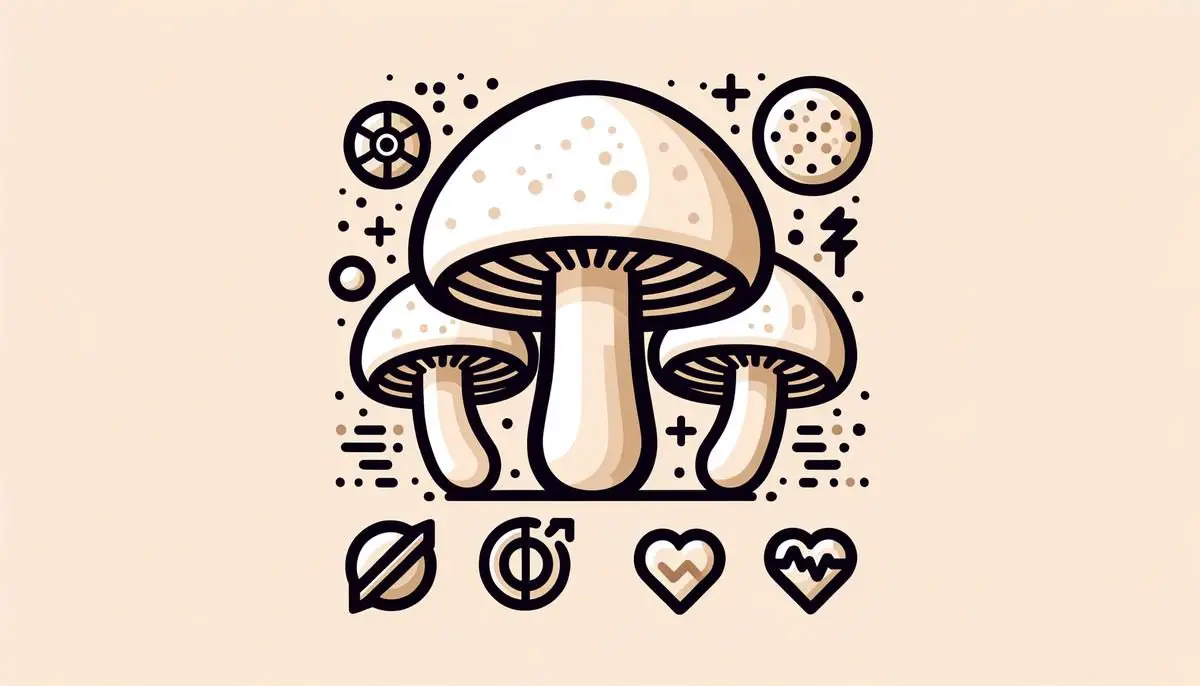
Nutritional Profile
Nutritional Profile
White button mushrooms are a nutritional powerhouse, all while keeping the calorie count low. A single serving (about 100 grams) only has 22 calories, making them an ideal choice for anyone watching their calorie intake.
With 3 grams of protein per serving, they offer a good source of this essential macronutrient, which is substantial for a vegetable. This makes them a fantastic option for vegetarians and vegans looking to boost their protein intake.
White button mushrooms are a meaningful source of riboflavin (or vitamin B2) and niacin (vitamin B3), hitting 30% and 22% of the daily value, respectively, in just one serving. Riboflavin plays a crucial role in energy production and maintains healthy blood cells, while niacin supports digestion and skin health.
These mushrooms also offer 6% of the daily value for potassium, which contributes to strong bones, proper muscle function, and heart health. Additionally, they are one of the very few non-animal food sources of vitamin D, known as the "sunshine vitamin." This makes them especially beneficial for those following a plant-based diet, as vitamin D aids in calcium absorption, which is essential for bone health and avoiding osteoporosis.
White mushrooms also contain selenium, an essential mineral with powerful antioxidant properties that support the immune system and prevent damage to cells and tissues. They also contain phosphorus, contributing to the health of your bones and teeth.
For those following a plant-based diet, white button mushrooms are a potential non-animal source of vitamin B12. While research is still ongoing, they might help fill that nutritional gap for vegans and vegetarians.
Lastly, these mushrooms provide 1 gram of dietary fiber per serving, contributing to your daily fiber needs and promoting good digestive health.
All these nutrients bundled up in one low-calorie package underscore how white button mushrooms can be an exceptional addition to your diet. Whether you're adding them to a pizza, salad, or sautéing them as a side dish, you're not just boosting flavor but also significantly enhancing your meal's nutritional profile.
Health Benefits
Health Benefits
White button mushrooms offer several health benefits beyond their nutritional value. Research suggests they may help in the fight against cancer, cholesterol, and compromised gut health.
The antioxidants and polysaccharides like beta glucan found in these mushrooms play a role in tackling oxidative stress, which, left unchecked, can contribute to the development of cancer. Specific compounds, such as ergothioneine and selenium, act as cellular protectors, defending your body's cells against damage.
The beta glucan, a form of soluble dietary fiber abundant in these mushrooms, helps lower bad cholesterol levels. It acts like a sponge in the digestive system, soaking up LDL cholesterol and removing it from the body. This plays a significant role in maintaining heart health and reducing the risk of heart disease.
White button mushrooms also contribute to gut health. The polysaccharides they contain are fantastic prebiotics, providing food for beneficial gut bacteria. A thriving community of good gut flora contributes to a strong digestive system, bolstered immune response, and overall well-being. Additionally, these mushrooms help reduce inflammation in the gut, preventing issues like leaky gut syndrome.
Integrating white button mushrooms into your diet could provide significant health benefits extending far beyond their humble appearance. From bolstering the body's defense against cancer to lowering bad cholesterol levels and strengthening gut health, they're doing more work than meets the eye. Plus, their role in providing a variety of B-vitamins makes them an even more valuable contributor to your health and wellness.1,2

Culinary Uses
Mushrooming Around the Kitchen: The Versatile White Button
White button mushrooms are the denim of the food world; they go with everything. Their mild flavor and delightful texture blend seamlessly with any recipe, making them a favorite across various cuisines.
These mushrooms are more than just salad toppers. When sautéed in butter or olive oil, they transform, adopting a rich, full-bodied flavor that boldly complements any dish.
For breakfast, toss some chopped white buttons into an omelet for an enhanced meal. They fit just as comfortably within a quiche or alongside sunny-side-up eggs.
The versatility of white button mushrooms knows no boundaries. Slice them into strips and stir them into a simmering soup for an umami boost. Dice them and incorporate them into meatballs or burger patties; their texture offers juiciness while letting the meaty flavors lead. Or, let them take center stage as a meat substitute in hearty lasagnas and succulent stroganoffs.
White mushrooms also excel as a stuffing ingredient, hiding fillings or masking as meats with ease, tantalizing taste buds while sneaking in a nutritional punch.
Before using these mushrooms, give them a swift but gentle wash under water or brush off any visible dirt with a soft brush. To preserve their freshness, store them in the refrigerator in their original packaging or a paper bag.
From raw to roasted, white button mushrooms lift any dish from mundane to magical with their mild yet magnificent presence. So next time you gaze into your kitchen wondering where adventure may lie, reach for the white buttons – your culinary passport to delicious destinations.

In the end, the humble white button mushroom stands out for its ability to enrich our meals and our health quietly but profoundly. It's not just another ingredient; it's a testament to the beauty of simplicity in our diets. Next time you spot them in your grocery store, remember, these little fungi are tiny titans of nutrition and taste, ready to make your next meal not just delicious but significantly healthier.
- Valverde ME, Hernández-Pérez T, Paredes-López O. Edible mushrooms: improving human health and promoting quality life. Int J Microbiol. 2015;2015:376387. doi:10.1155/2015/376387
- Feeney MJ, Dwyer J, Hasler-Lewis CM, et al. Mushrooms and Health Summit proceedings. J Nutr. 2014;144(7):1128S-36S. doi:10.3945/jn.114.190728



